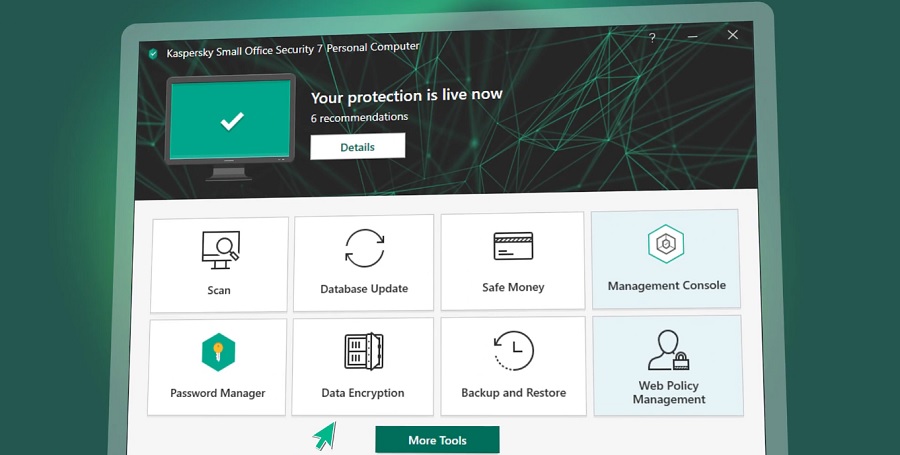Moscow-based anti-virus software maker Kaspersky has responded to Germany's Federal Office for Information Security (BSI) recent recommendation to use alternative products in the wake of the Russian invasion of Ukraine. The tech company said the warning was based on "political grounds" and not determined on technical assessments of its cybersecurity tools.
Kaspersky countered the BSI's warning in an official statement on Tuesday, insisting to its partners and customers in Germany that it is a private cybersecurity company with operations in different parts of the world. The company added that, as a private company, it has no ties with the Russian government.
"We believe that peaceful dialogue is the only possible instrument for resolving conflicts," Kaspersky said. "War isn't good for anyone." The company added that it aims to work with BSI for clarifications and to address its concerns.
The company's statement comes shortly after the BSI officially recommended German companies and agencies using tools developed by Kaspersky to use alternative software products for cybersecurity. "The actions of military and/or intelligence forces in Russia and the threats made by Russia against the EU, NATO and the Federal Republic of Germany in the course of the current armed conflict are associated with a considerable risk of a successful IT attack," BSI's press release reads (via machine translation).
Germany's federal infosec agency warned that a Russian IT company such as Kaspersky could launch operations on its own or be forced by the Russian government to "attack." The BSI also noted that operations of Russia-based tech companies could be placed under surveillance without its knowledge or be used against its customers.
Kaspersky also pointed out that it has moved its data processing facilities to Switzerland as of 2018. The company added that "malicious and suspicious files voluntarily shared" by its customers in Germany are being processed in two data centers located in Zurich. Other statistics shared from computers and networks using Kaspersky products are processed in facilities around the world, including Canada and Germany, the company said.
Despite BSI's warning, the agency is not banning Kaspersky's products in Germany. But it is encouraging German companies and organizations to conduct their own assessments or consult with BSI-certified IT security service providers.



 Alphabet’s Massive AI Spending Surge Signals Confidence in Google’s Growth Engine
Alphabet’s Massive AI Spending Surge Signals Confidence in Google’s Growth Engine  Palantir Stock Jumps After Strong Q4 Earnings Beat and Upbeat 2026 Revenue Forecast
Palantir Stock Jumps After Strong Q4 Earnings Beat and Upbeat 2026 Revenue Forecast  Nvidia Confirms Major OpenAI Investment Amid AI Funding Race
Nvidia Confirms Major OpenAI Investment Amid AI Funding Race  Global PC Makers Eye Chinese Memory Chip Suppliers Amid Ongoing Supply Crunch
Global PC Makers Eye Chinese Memory Chip Suppliers Amid Ongoing Supply Crunch  Nintendo Shares Slide After Earnings Miss Raises Switch 2 Margin Concerns
Nintendo Shares Slide After Earnings Miss Raises Switch 2 Margin Concerns  Jensen Huang Urges Taiwan Suppliers to Boost AI Chip Production Amid Surging Demand
Jensen Huang Urges Taiwan Suppliers to Boost AI Chip Production Amid Surging Demand  Nvidia Nears $20 Billion OpenAI Investment as AI Funding Race Intensifies
Nvidia Nears $20 Billion OpenAI Investment as AI Funding Race Intensifies  Baidu Approves $5 Billion Share Buyback and Plans First-Ever Dividend in 2026
Baidu Approves $5 Billion Share Buyback and Plans First-Ever Dividend in 2026  Elon Musk’s Empire: SpaceX, Tesla, and xAI Merger Talks Spark Investor Debate
Elon Musk’s Empire: SpaceX, Tesla, and xAI Merger Talks Spark Investor Debate  Sam Altman Reaffirms OpenAI’s Long-Term Commitment to NVIDIA Amid Chip Report
Sam Altman Reaffirms OpenAI’s Long-Term Commitment to NVIDIA Amid Chip Report  Instagram Outage Disrupts Thousands of U.S. Users
Instagram Outage Disrupts Thousands of U.S. Users  SpaceX Pushes for Early Stock Index Inclusion Ahead of Potential Record-Breaking IPO
SpaceX Pushes for Early Stock Index Inclusion Ahead of Potential Record-Breaking IPO  SpaceX Updates Starlink Privacy Policy to Allow AI Training as xAI Merger Talks and IPO Loom
SpaceX Updates Starlink Privacy Policy to Allow AI Training as xAI Merger Talks and IPO Loom  Amazon Stock Rebounds After Earnings as $200B Capex Plan Sparks AI Spending Debate
Amazon Stock Rebounds After Earnings as $200B Capex Plan Sparks AI Spending Debate  Oracle Plans $45–$50 Billion Funding Push in 2026 to Expand Cloud and AI Infrastructure
Oracle Plans $45–$50 Billion Funding Push in 2026 to Expand Cloud and AI Infrastructure  Nvidia CEO Jensen Huang Says AI Investment Boom Is Just Beginning as NVDA Shares Surge
Nvidia CEO Jensen Huang Says AI Investment Boom Is Just Beginning as NVDA Shares Surge 































